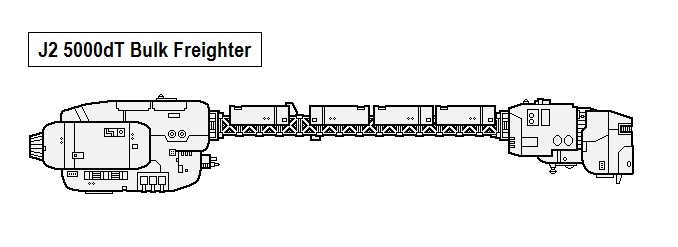Sagacity class Bulk Freighter
| Sagacity class Bulk Freighter | |
|---|---|
 Unpublished, non-canon fan design. | |
| Type: TB Transport | |
| Size | 5,000 Tons |
| Hull Configuration | [[Dispersed Structure Hull]] |
| Streamlining | Unstreamlined Hull |
| Tech Level | TL–11 |
| Engineering | |
| Computer | Model/3 |
| Jump | J-2 |
| Maneuver | 1 G |
| Armaments | |
| Hardpoints | 50 |
| Accommodations | |
| Staterooms | 0 |
| Personnel | |
| Crew | 38 |
| Officers | 8 |
| Enlisted | 30 |
| Marines | 5 (Security) |
| High/Mid Passengers | 0 |
| Payload | |
| Cargo | 3,093 Tons |
| Fuel tank | 0 Tons |
| Construction | |
| Origin | Distant Fringe |
| Price | |
| Cost | MCr2,011.050 (base) MCr1,608.840 (qty) |
| Architect fee | MCrAde Stewart |
| Statistics | |
| Quick Ship Profile | Not Applicable |
| Images | |
| Blueprint | No |
| Illustration | Yes |
| Source | |
| Also see | Freighter |
| Canon | Unpublished, fan design |
| Era | 1105 |
| Reference | Ron Kline Design |
| Starships are designed with the Classic Traveller format, using High Guard Shipyard v1.13 written by Andrea Vallance. | |
The Sagacity class Bulk Freighter is a mercantile starship.
- It is a civilian ship and a Transport.
- Please also see AAB article: Ships of the Distant Fringe.
Description (Specifications)
The Sagacity class is a large Transport ship found operating within the Distant Fringe region. It is classified as a Bulk Cargo Carrier and is constructed as a conventional design. The dispersed structure hull is inexpensive but the configuration renders the vessel incapable of independent refueling operations.
- The vessel is a TL-11 design.
Image Repository

A Sagacity class Bulk Freighter.
Basic Ship Characteristics
Following the Imperial Navy and IISS Universal Ship Profile and data, additional information is presented in the format shown here. The small craft factor indicates the number of squadrons (of ten craft) carried on the ship. Tonnage on the universal ship profile is shown in kilotons (thousands of tons) where necessary. [1]
| Basic Ship Characteristics [2] | ||
|---|---|---|
| No. | Category | Remarks |
| 1. | Tonnage | The Sagacity class Bulk Freighter is constructed using an 5,000 dTon hull built in a dispersed structure configuration. The hull is unstreamlined and has no capability to perform atmospheric operations.
|
| 2. | Crew | Total Crew Complement: x38
Accommodations There are x25 Staterooms.
There are x2 Low Berths, primarily used for medical emergencies. Accessible areas of the hull are fitted with grav plates and inertial compensators and have full life support and environmental systems.
|
| 3. | Performance | The vessel mounts a DeVoss-type Jump-2 drive, a Maneuver-1 drive, and a Power Plant-2, giving performance of Jump-2, 1-G acceleration, and producing 100 Energy Points. The ship has an agility rating of 1. The internal fuel tankage is sufficient for one Jump-2 and gives the power plant 4 weeks duration.
|
| 4. | Electronics | Adjacent to the bridge is a Model/3 Computer: the vessel has a backup Model/3 Computer.
|
| 5. | Hardpoints | x50 hardpoints.
|
| 6. | Armament | The Sagacity is unarmed. |
| 7. | Defenses | The hull is unarmored.
|
| 8. | Craft | The vessel carries no subcraft.
The Bulk Freighter has the capacity to carry up to 2,000 dTons of smaller vessels. There are large numbers of berthing points located along the vessels central spine, each connected to a crew access hatch. |
| 9. | Fuel Treatment | The vessel has internal fuel tankage of 1,100 dTons.
|
| 10. | Cost | The basic cost of the vessel is MCr2,011.050. |
| 11. | Construction Time | 112 weeks (28 months) as standard.
|
| 12. | Comments | Standard cargo capacity amounts to 1,090 dTons of internal (protected) volume.
The ship carries a collapsible fuel tank with a capacity of 1,000 dTons and a stowed volume of 10 dTons. The vessel may also externally mount up to 2,000 dTons of goods and freight secured along the vessels central spine: this cargo is carried in vacuum conditions and must be protected accordingly. |
History & Background (Dossier)
The design was based on the High Liner class Bulk Freighter, originally commissioned for the Bright Conclave in Halcyon Sector and was originally conceived as a military ship transporter capable of carrying a pair of 1,000 dTon Rysos class Battle Barges. This carrying capacity can be dynamically reconverted to suit mission needs and parameters using modular hull pods that marry into the vessels spine:
- The ship can serve as a research lab. Such vessels can support university or corporate field research.
- Passenger modules, containing large numbers of Staterooms or Low Berths, may be carried.
The design is representative and a large number of variants exist. Typically, variants of the design have different weapons systems, onboard electronics, and a different internal layout.
Overburden
The Sagacity class is capable of carrying "overburden" cargos: a payload of up to 7,000 dTons. The major limiting factor on overburdening a vessel is the capability of the ship's DeVoss Jump Drive. If the total displacement tonnage of the vessel, including its overburden cargo, is dTons or more, the volume prevents the drive making a jump-1 transition.
- The overburden payload increases the ship's displacement tonnage – to an upper limit of 10,000 dTons – but any degree of overburdening reduces its performance to jump-1 and 0.5G acceleration.
- The payload must be fully contained within the jump bubble.
- The practice of overburdening a ship places extreme stresses and strains on the internal equipment and dramatically increases the chances of a catastrophic failure.
Class Naming Practice/s & Peculiarities
A number of companies manufacture ships equivalent to the Sagacity class. They vary in hull shape and internal layout but all share the same basic design and all have very similar capabilities and performance characteristics.
- Each variant class is named by the company that produces it: these organizations generally draw on traditional naming protocols. It is not uncommon for a historical class name to be reused.
- Individual vessels within a class are issued specific serial numbers and transponder codes but traditionally are named by their first crew, though from a list of approved options. This is considered a serious affair and a ship with a frivolous name is considered "unlucky".
Selected Variant Types & Classes
Merchant Vessel AKA Bulk Cargo Carrier:
References & Contributors (Sources)
| This article has metadata. |
| This article is missing content for one or more detailed sections. Additional details are required to complete the article. You can help the Traveller Wiki by expanding it. |
- Book 5 High Guard GDW 1980 (Design Sequence Used)
- Traveller Wiki Editorial Team
- Author & Contributor: Lord (Marquis), Captain, and Lead Naval Architect Ronald B. Kline, Jr. of the Imperial Navy
- Author & Contributor: Lord (Marquis) and Master of Sophontology Maksim-Smelchak of the Ministry of Science
- ↑ Timothy B. Brown. Fighting Ships (Game Designers Workshop, 1981), 10.
- ↑ Timothy B. Brown. Fighting Ships (Game Designers Workshop, 1981), 10.